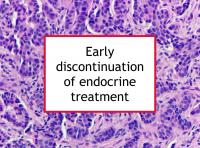Women with estrogen receptor positive (ER+) breast cancer who complete their anti-estrogen treatments (aromatase inhibitor or tamoxifen) tend to have better recurrence and survival outcomes than women who do not. Nevertheless, a significant minority of women do not finish their intended treatment schedule. Now a new study has reported how early discontinuation affects recurrence and mortality.
Women end anti-estrogen treatment for the most part because of side effects, which can reduce quality of life or result in new medical conditions, but which in themselves can indicate that the treatment is working. Sometimes a switch in aromatase inhibitor or to or from tamoxifen can provide enough relief of symptoms to make further anti-estrogen treatment possible.
Latest research reports consequences of early treatment end
The Canadian study referenced above was designed to investigate the survival outcomes of women with ER+ breast cancer who prematurely discontinued planned five-year endocrine treatment. Risk factors for early discontinuation were also evaluated. To conduct the study, the authors identified 6,823 women aged 50 to 80 (presumably postmenopausal) who underwent primary surgery for ER+ breast cancer in Alberta between 2010 and 2015.
A total of 27.3% of the study participants discontinued endocrine therapy early (before the five years were up), 50.9 % completed the prescribed five years, and 21.8% were not prescribed any endocrine therapy. Factors associated with increased the likelihood of early discontinuation included age > 70 at diagnosis, lower-stage disease, HER2-negative status, and no prescribed chemotherapy or radiotherapy.
Early discontinuation increased the likelihood of all-cause mortality and recurrence. It was also found to be associated with sharply higher rates of breast cancer-specific death compared to completing treatment. Those with higher tumor stages tended to experience the worst outcomes. However, the survival outcomes of those ending treatment at some point in the fifth year were not significantly different from those who completed all five years.
The authors comment that early discontinuation of endocrine therapy was associated with increased risks of recurrence and breast cancer-specific mortality. The prognostic impact of early discontinuation varied by tumor stage, and up to a one-year reduction in treatment duration did not appear to reduce effectiveness. Targeted interventions for eligible ER+ breast cancer patients has the potential to help improve treatment adherence and survival, according to the authors.
Please see our article on endocrine treatment and prognosis for more information.
